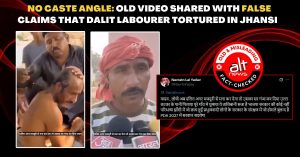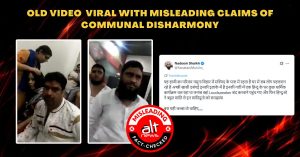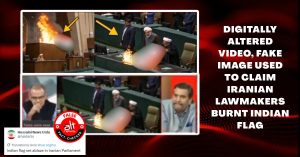Since the last few days, social media has been buzzing with the news of Dr. Makarand Paranjape, author and Professor at Jawaharlal Nehru University being stopped from attending a video recording at Carleton University in Canada by Dr. Chinnaiah Jangam, Assistant Professor at the university. The news was originally carried as a Press Release by Overseas Friends Of India, Canada. A Twitter account in the name of OFI, Canada was created in May and this Press Release and Prof Paranjape’s talk were tweeted from this account. Dr. Paranjape also wrote an open letter to the President and Vice-Chancellor of the Carleton University about the incident. The news of Dr Paranjape’s recording being cancelled at the last minute “at the instigation of Assistant Professor Chinnaiah Jangam who aggressively bullied the university authorities” was also carried in Swarajya magazine.Dr Chinnaiah Jangam had responded to Dr Paranjape’s allegations a few days ago and we had published Dr Jangam’s rebuttal (https://go.altnews.in/2qhFak7).
Dr Paranjape wrote to us wanting to respond to Dr Jangam’s rebuttal. The full text of Dr Paranjape’s response is reproduced below.
Response by Makarand R. Paranjape to:
“Are you Stating Facts, Dr. Makarand Paranjape?”, Dr. Chinnaiah Jangam presents his side of the story”
Re: the incident of 3 May 2017 at Carleton University, I would like to counter Asst. Prof. Chinnaiah Jangam on two grounds: facts and principles. But since most people have little time and less patience for the point by point refutation below, let me state the main issue simply and concisely. This is not a debate over whose politics or ideology is better, Asst Prof Jangam’s or mine. He believes that he should stop those whose views he disagrees with from undertaking legitimate and invited activities at Carleton University. It is this attitude that I totally disagree with; far from being a champion and defender he is an intolerant opponent of liberalism and freedom of expression. In this particular case, he actually succeeded in his design. The recording to which I was invited was cancelled.
Now to a more detailed rejoinder.
Part I: Facts
1. Asst. Prof. Jangam accuses me of the “secretive use” of the campus of Carleton University. But earlier in the same paragraph, speaking of my travels, he observes: “He has been on an overseas tour on the invitation of the organisation ‘Indic Book Club’ and has been publicising his talks regularly on Twitter. On May 2, 2017, he tweeted ‘Next stop: Carleton U, with Dr. Harsha Dehejia (with a picture of Dehejia), speaking on ‘Drishti: Is there an Indian Way of Seeing,’ to be recorded for CU TV.” How is my Carlton visit “secretive” if I publically announced it? In this regard, Dr. Dehejia reiterated to me in his email received on 12 May 2017: “Your event was not at all secretive. It was cleared by Prof. Shane Hawkins, Chair of the College of the Humanities. … Over the last 15 years, I have made about 10 video conversations with visiting artists and academics all of which I regularly use in my course RELI2515. This enriches my course and sometimes gives a different point of view.”
2. The above verifiable email puts paid to Asst Prof Jangam’s claim that I did not have “an official invitation from Carleton.” On the contrary, I was not only officially invited by Adjunct Professor Dr. Harsha V. Dehejia, but confirmed in an to Ms. Judy Donaldson, College Administrator, College of Humanities, Carleton University, my acceptance of the invitation and my permission to be recorded. I was also offered a modest honorarium from Carleton University for this recording. The prerequisite of any such payment has to be an official invitation, with a paper/email trail to prove it. Needless to say, after Asst Prof Jangam’s crusade scuppered the recording at the Media Centre, I declined and returned the payment. Therefore, at Asst Prof Jangam’s instigation, not only was an official programme, with an official invitation, cancelled, but such a cancellation also resulted in financial loss to me. Asst Prof Jangam not only tarnished my reputation, but caused me a quantifiable financial loss.
3. Asst Prof Jangam claims that I used Carleton “campus name and legitimacy” to promote the “recording as an achievement” of my “political campaigns on social media.” Wrong: I neither seek Carleton’s name nor legitimacy—my work speaks for itself. But isn’t it also possible that Carleton gains by visits by internationally published and known academics like me? As to seeking “legitimacy” for my “political campaigns on social media,” the charge is uninformed, if not unintelligent. I am an academic, not a politician; I entered the social media space quite recently not to conduct political campaigns but to publish information about my popular writings, especially columns in newspapers and periodicals. In the process, I have also posted brief comments and formulations, which may easily be misread, as often happens on SM. But I have invariably refrained from any hurtful or inflammatory posturing. In contrast, in the few tweets of Asst Prof Jangam that I have I encountered, he has already called me “liar” and other unsavoury epithets several times. In addition, I have posted originally composed haikus, because the 140-character medium is eminently suitable for such sharing. In my self-description, I also declare that I “not merely a political animal.” My point is that SM, especially Twitter, cannot be the sole means to “judge,” “brand,” and “condemn” a person’s politics, as Asst Prof Jangam seems to do, let alone declare him persona non grata on a campus.
4. Asst Prof Jangam claims that I do not “stand for the Canadian values.” This accusation seems contra-factual given that I’ve had several multiple-entry visa and have been invited to several Canadian universities. I’ve was invited to Carleton itself way back in 2002, long before Asst Prof Jangam’s hire. I have spoken on numerous occasions, participated in several academic activities, and given lectures in scheduled classes, and recorded several programmes for Carlton University TV. Some of the latter have been used by several batches of students of the introductory Hinduism and other India-related courses, plus members of the public. Not one person has found anything objectionable, let alone clashing with “Carleton values.” What makes Asst Prof Jangam pontificate or adjudicate on said values or stigmatise even ban those who don’t conform to his way of thinking?
5. Asst Prof Jangam avers: “At no point did I ask him to cancel the recording.” After I read this denial, I emailed Dr. Dehejia. May I be permitted to quote him verbatim: “I decided not to go ahead with the video conversation with you only when he [Asst Prof Jangam] said, ‘I do not want this event to go through. Prof. Paranjape should not be allowed to use the facilities of Carleton University.’” Asst Prof Jangam adds, “I was not against Paranjape’s visit to campus and if it was an open lecture I myself would have attended and asked questions. But I do not support this secretive claim of legitimacy and would like to register my protest.” I have already established that there was nothing “secretive” about the recording, nor was it a “claim to legitimacy.” But Asst Prof Jangam’s distinction between “secretive” recording and “open lecture” is utterly specious; the two are different, but equally legitimate and “official” activities, serving different functions. The former to be broadcast to students and interested viewers does not require an audience or prior announcements, let alone publicity. That does not somehow make it underhand or sinister. An open lecture, on the other, hand, may be open to all or only to registrants. There might be many other valid and valuable formats too, such as the recording of a lecture before a studio audience, followed by Q&A; an “open” lecture broadcast on FB live, followed by a web Q&A; a live lecture without recording or broadcast; and so on. A rudimentary experience of academic life would obviate an explanation such as this. I suspect that Asst Prof makes inconsequential and irrelevant distinctions between these formats to justify his disruption. More germane to the matter is that he did not “register his protest” as he claims, so much as stop the recording. If he had wanted to, he could have conveyed his objections, then left; instead, from what I have gathered, he insisted that the programme not go through as planned.
6. According to Asst Prof Jangam, I have “been writing against the affirmative action for Dalits (untouchables in India).” False again. I am not anti-Dalit, let alone being anti-reservations, but I believe that they should not be based solely on caste. Economic criteria should also be applied. I have often asked reservation activists: won’t caste-based reservations reinforce rather than annihilate caste? How long should caste-based reservation continue? Won’t caste-based quotas end up in an even more rigid caste system? Frankly, I have not found satisfactory answers to such questions. Before going to the next point, I also want very strongly to object to his use of the phrase “untouchables in India”; he should know that untouchability has been outlawed in India since our independence.
7. Asst Prof Jangam accuses me of the “endorsement of anti-Muslim … ideas and violence.” False again. Once again, let me state my position. I oppose violence in the name of any religion, in addition to theologically sanctioned terrorism, vandalism, conversion, and hatred. That is why I have argued that modern-day Muslims, especially those professing to be liberal and democratic, ought to condemn such acts more vocally. There are several such hate-mongers in our midst today in India. This is an example of what I oppose: the lynching of Mohammad Hussain in Bengaluru for being a BJP worker. Or this diktat by radical Muslim organisation Hizbul Mujahideen. Does Asst Prof Jangam support such hatred and violence in the name of Islam? How can its condemnation make one “anti-Muslim”? Just to be additionally sure that Asst. Prof. Jangam understands, I also deplore “cow-vigilantes” and the violence of the Hindu right.
8. I would not like to engage with Asst. Prof. Jangam on his “casteist” slurs on the Overseas Friends of India, who at very short notice organised an alternate event. But I very strongly object to the falsehood that Dr. Dehejia “went ahead to hastily organise a talk by Dr. Paranjape in a restaurant following this incident,” which “also demonstrates dishonesty.” I would like to state quite categorically that Dr. Dehejia had nothing to do with the alternate event; he merely attended it. In fact, when invited to say a few words at the end, he politely declined and sat down. That event was solely the responsibility of the Overseas Friends of India, who put out the press release too.
I am sure Dr. Dehejia, one of the most respected members of the Indian community in Ottawa, does not need my defence. He is one of the most admired physicians and allergists in Ottawa, with a successful practice stretching over fifty years. He has served the community in multiple ways, including offering free medical consultation to the Indian High Commission in Ottawa. He has helped and healed thousands during his long and illustrious career. He is also an eminent Indologist and writer, having earned a PhD from the Anantacharya Institute of Indological Studies, Mumbai University, in addition to his MD. As Adjunct Faculty in Humanities at Carleton, he has taught a popular and successful introductory course in Hinduism for years without taking a single penny from the university. In fact, he has created a Dehejia Hindu Fund primarily with his own money to sponsor or assist important Indian public figures, academics, creative artists, and eminent persons of all ideological hues and dispositions. I personally know that his list of invitees in recent years includes many who cannot, even by a severe stretch, be labelled as Right Wing: for instance, Geeti Sen, Devdutt Patnaik, Ashok Vajpayi. He must apologise for calling Dr. Dehejia dishonest.
9. Asst Prof Jangam says, “It is no wonder that he has been chosen to lead the Institute of Advanced Studies in Shimla, a plum post as Dr. Dehejia reminded me on May 3. Please see this article on how he was also shortlisted … as a potential VC of Nalanda University last year.” I have never claimed that I have been “chosen,” even shortlisted, “to lead” IIAS, Shimla; perhaps, Asst Prof Jangam is relying on newspaper leaks, rumours, or Dr. Dehejia’s own kindly, if hopeful, wish. Someone else has been appointed Vice-Chancellor of Nalanda University; re: IIAS Shimla, like anyone else, I cannot say what the outcome might be. But the important thing to note is that such shortlisting or being tipped for higher administrative positions is not new; even under the previous UPA regimes, my name made the rounds, even reached the final stages of the selection process for one or two key appointments. Doesn’t this suggest the opposite of Asst Prof Jangam’s insinuation—the consideration of my candidature is not because of ideological affiliation but in spite of it? Please, Asst Prof Jangam, this spat is not about credentialism vs. favouritism, but freedom vs. intolerance on campuses; do not try to obfuscate the issue.
10. My last point in the “facts” part of my response is Asst Prof Jangam’s assertion that I have “aligned” myself “more openly than ever before … with the RSS.” For those who do not know it, the RSS or Rashtriya Swayamsevak Sangh, is perhaps the largest socio-cultural organisation in the world, with multiple sub- and sister bodies. Much has been researched and written on it; indeed, this is not the place to determine what it stands for or what its true character is. Let me unequivocally state that I am not a member of the RSS, but I do not agree with Asst Prof Jangam’s slur that it represents “regressive, undemocratic, non-secular values … against the basic Canadian values of equality, secularism, and humanism.” I am nobody to defend the RSS, which has attained greatness, influence, and power because hundreds of thousands of selfless volunteers and patriots have devoted decades in the service of the nation under its aegis. If it is a crime to move closer to the RSS, then let me plead “guilty.” Let me tell Asst Prof Jangam and my other detractors why this has happened. I have been sick and tired of the divisive and infructuous politics of Left vs Right, Hindu vs Muslim, Sikh vs Hindu, Dalit vs Upper Caste, secular vs Hindu, woman vs man, North Indian vs South Indian, “Aryan” vs “Dravidian,” Khalistani vs Indian, and so on; it nauseates me by its hypocrisy and lack of integrity. I support the RSS because it is perhaps the only organisation in the present scenario which avers, “We are one, regardless of caste or creed: we are all Indian, all Bharatiya.” I like this message of the RSS. I intend to continue to support it until I know otherwise.
Part II: Principles
I had ten factual disputations with Asst Prof Jangam, but when it comes to principles, I have only one. The fundamental principle on which I disagree with Asst Prof Jangam is his belief that he can arbitrate for everyone else what Canadian values are, what Carleton stands for or, for that matter, who should or should not be allowed on his campus. Furthermore, he refuses to discuss, debate, dissent but tries to, in this case, succeeds in, shutting down what other people are doing. I would submit that such matters are open to varied interpretations and must be worked out carefully, with room for differing views. In this case, my recording on “Drishti: Is There an Indian Way of Seeing?” had nothing to do with his work, his field of advertised expertise or, for that matter, his politics, which centres on caste. Yet, because he detests some of my purported beliefs or alleged ideological leanings, he had the temerity to interfere, disrupt, and shut down an official Carleton event. Asst Prof Jangam needs to learn that that is not what Canadian, Carleton, or indeed, democratic values in free societies all over the world, stand for.
Last year, when he listened to my invited Gandhi talk in one of the Carleton courses and joined me for lunch, I told him how proud I was of him and his achievements, especially since he studied at two institutions, University of Hyderabad, where I taught, and JNU, where I have been Professor for nearly seventeen years. After his attack on me, I decided to take a closer look at his work. I am afraid that I am constrained to revise my view of him. I find that he comes across primarily as a polemicist and crusader, internationally “caste-lashing” India, indulging in rampant name-calling, fact-twisting, and “Hindu bashing.” If I may address him directly through this forum, I would tell him, “Sir, there is much more to academics than invective, slating, and ranting. Indeed, mere philippic does not a scholar make. Name-calling, distortion of truth, quoting out of context, making irrelevant and unsubstantiated allegations and, ultimately, using all these to justify the unjustifiable, in this case, your assault on the freedom of expression on an internationally renowned university of which you have the privilege to be a member, does not behoove you, the institutions that trained you, or the country and culture that you come from.”
Conclusion
From all the evidence at hand, it is fairly obvious that Asst Prof Jangam disrupted and stopped an official programme at Carleton because he was opposed to the alleged ideology of one of the participants. A simple test of this hypothesis is to raise the contra-factual possibility of what might have happened if he had not intervened? Wouldn’t any sensible person agree that the recording would have gone ahead as scheduled? If the only reason it was cancelled was his presence and protest, accompanied by real or veiled threats, how can he evade responsibility? How can he try to shift the blame onto someone or something else? What is more, his statements clearly indicate his intentions, even if he does not own up their outcomes. He definitely intended to stop the programme; no, not just that, he believed and still does that both his actions and intentions are justified.
May I finally and respectfully point out that we are not debating the content of our respective ideologies, beliefs, or political positions. What we are debating is whether Asst Prof Jangam had the right to disrupt, shut down, or stymie those he disagrees with or whose positions he dislikes. Even a modicum of understanding of liberal values would clarify that they imply multiple, even contrary points of views, not for one person’s dogmatic opposition to someone else’s view to push the latter out of the public space. While Asst Prof Jangam has every right to adhere, even espouse, what he believes, he cannot decide for the University, for Canada, or for India what liberal values are or what is “not good for any society.” He certainly does not have the right to stop others from doing what they believe in on the basis of the certainty of his convictions. That is why I used the word “bullying” to describe his conduct; I could have used worse. Because, frankly, his mode of functioning is the very antithesis of what liberal academics is. Armed with some belligerent notion of political correctness or the other, he, and many others all over the world, strut about and stalk our campuses, scaring opponents into submission or silence. They may consider themselves intellectual “activists,” but some of their actions better fit the epithet “intellectual terrorists.” I have not—and will not—characterize Asst Prof Jangam thus, but I will call out his aggressive and intimidating tactics against ideological and political opponents. I will also question, critique, and oppose, whenever I must, his hiding behind some pseudo-noble ideal to rationalise wrong-doing. People like Asst Prof Jangam claim to be victims, but come across as aggressors; they speak in the name of liberal values but reveal themselves to be intolerant even to differing, let alone opposing, views.
To end, let me quote another social justice activist, also from an underprivileged background, who says in a moving article that “Hinduism and Indian Civilisation belongs to Dalits and ‘lower castes’ as much as it belongs to any other community. In fact, it belongs to us even more. If you erase Indian civilisation and Hinduism, you erase us too”— what a clear and straightforward message, though so contrary to your way of thinking.
Independent journalism that speaks truth to power and is free of corporate and political control is possible only when people start contributing towards the same. Please consider donating towards this endeavour to fight fake news and misinformation.




